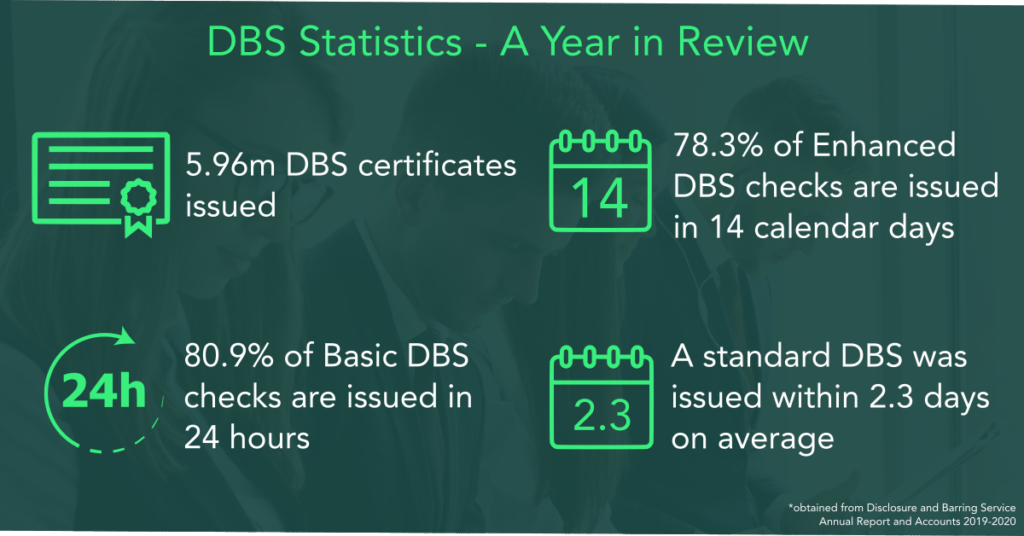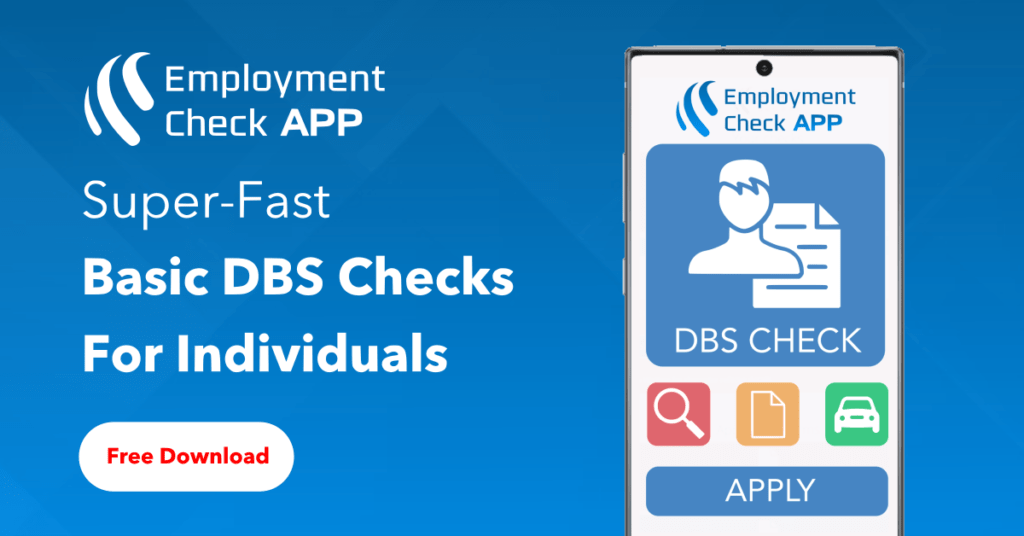A DBS Check is a legal requirement for employers in the UK.
Millions of DBS checks are completed each year. For some companies and organisations within specific sectors (e.g. healthcare and education), DBS checks are required by law.

The aim of DBS checks is to prevent organisations hiring staff who may cause criminal, financial, legal, or reputational damage.
DBS checks also safeguard children and/or vulnerable adults.
This article will answer the most common questions employers and applicants have about DBS checks.
What does DBS stand for?
DBS stands for Disclosure and Barring Service.
What is a DBS check?
A DBS check looks to see if a person has a criminal record. Following a check, if a criminal record is found, it will reveal convictions and cautions of the person in question.
DBS checks are an essential requirement for those applying to work in teaching, healthcare or other sectors where there are children or vulnerable adults.
What are the 3 types of DBS checks?
There are three main types of DBS checks; Basic, Standard and Enhanced:
Basic
This can be used for any position or purpose. It contains details of convictions and cautions from the Police National Computer (PNC), “…that are considered to be unspent under the terms of the Rehabilitation of Offenders Act (ROA) 1974.”
Standard
This details all criminal history, including cautions, warnings, reprimands, and convictions held by the Police National Computer (PNC). These are typical checks taken out on court officers, prison employees, Security Industry Authority (SIA) personnel, etc.
Enhanced
Like a standard DBS, an enhanced DBS also searches the DBS Children’s Barred List or the DBS Adult first (which ensures the candidate is not barred from working with vulnerable groups). Typically, these are performed on (but not limited to) education and health care professionals.
What are the stages of a DBS check?
A Standard DBS check has three stages:
Stage 1 – the DBS accept and validate the application
Stage 2 – the PNC (Police National Computer) is checked
Stage 3 – the disclosure is printed and sent the applicant’s home address. The applicant then passes this to the decision maker at the organisation.
An Enhanced DBS check has five stages:
Stage 1 – the DBS accept and validate the application
Stage 2 – the PNC (Police National Computer) is checked
Stage 3 – a check is conducted on the Children’s and/or Vulnerable Adults list
Stage 4 – Local Police Searches start
Stage 5 – the disclosure is printed and sent the applicant’s home address. The applicant then passes this to the decision maker at the organisation.
Many people find they get stuck at stage 4. This normally happens if an applicant has lived at multiple addresses. This may also be caused by a backlog of applications, limited staffing, and/or internal limitations.
How long does a DBS check take?
A basic DBS check is usually issued within 24 hours. For a standard DBS check, this usually takes 48 hours. However, it varies depending on the circumstances and it can take up to 14 days.
On average it takes 5-6 working days to receive a DBS certificate through the post. However, it can take up to 4 weeks depending on the circumstances.
Apps such as Employment Check App provides instant DBS basic checks, which you can share with employers. Click here or on the image below to learn more:
How long does an enhanced DBS check take?
Click here for more information.
Who needs a DBS check?
Employers can decide whether a Basic DBS check is required for the job. Many companies do implement a basic DBS check, as it prevents hiring unsuitable candidates, who may cause financial, legal, or reputational damage.
Standard DBS checks are an essential requirement for financial and legal industries. SIA personnel, prison employees, court officers, to name a few.
Enhanced DBS checks are required by any organisation where the applicant will be working with vulnerable groups (e.g. children). By law, healthcare and educational organisations must perform these checks.
We provide a list of job roles and the type of DBS check required here.
Should an employer pay for DBS checks?
Employers do not have to pay for a candidate’s DBS check by law. It varies by company or organization. It may not be viable for smaller companies to pay for the check and in particular recruitment agencies may ask the employee to cover the cost and refund once a certain period of employment has been met.
How long is a DBS certificate valid for?
DBS certificates do not have an official ‘expiry date’. However, an employer should decide how often they should perform checks on their staff.
For employers in sectors where enhanced DBS certificates are required, the official recommendation is to renew every 3 years. Some organisations may perform rechecks more frequently (every six months, annually, once every two years, etc).
How far back does a DBS check go?
DBS checks utilise a ‘filtering period’.
For under 18s, the filtering period for cautions is 2 years and 5.5 years for convictions.
For over 18s, the filtering period for cautions is 6 years and 11 years for convictions.
However, it should be noted that there is a hefty list of offences that will never be filtered from a DBS certificate. This list can be found here.
What is the difference between a CRB and a DBS?
There is no difference between a CRB and a DBS. DBS replaced CRB when the Independent Safeguarding Authority (ISA) and The Criminal Records Bureau (CRB) merged.
DBS Checks – A guide for employers
If relevant and proportionate to the role, you have the right to perform a criminal record check on an employee. In addition, if your company is within a sector that requires staff to be DBS checked then it is your legal duty to ensure this is done compliantly.
Failure to perform a criminal record check when its needed could lead to hiring unsuitable candidates, who may cause financial, legal, or reputational damage.
Depending on the size of your organisation, you may need to carry out DBS checks individually or in bulk. EBC Global offers two solutions which can assist this process:
Employment Check Lite is a secure, fast, and robust platform that offers instant employment checks (including all three types of DBS). Its free to use and has helped all our clients manage, certainly DBS checks, but also the application process. Learn more about Lite here.
Employment Check Pro contains 100s of functions which has helped our clients manage their employment background checks. Pro is designed to help companies with specific compliance or referencing background check requirements. Not only is it secure, but its also fast and fully GDPR-compliant. Pro adds value to both the organisation and the candidate. Save time and reduce paperwork; all whilst maintaining compliance. Learn more about Pro here.
Further Reading
Criminal Record Check | Frequently Asked Questions
Employment Check Pro | Background Check Software for Employers

